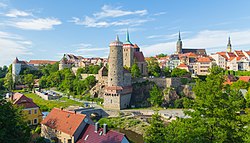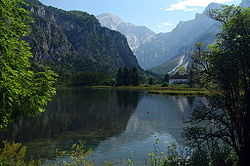Bloenland
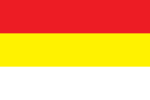
|
Kingdom of Great Blönland  Königreich Groß-Blönland (Blönnish Kalmish) Capital: Burgenau
Population: 17.355.500 (2020) Anthem: Blönlandlied |
Loading map... |
Blönland, formally the Kingdom of Great Blönland (Königreich Groß-Blönland) is a country in East Uletha. It borders Remsfalen to the west, Pyeokchin and Izaland to the south and the Sanain Republic to the east, as well as the Darcodian Sea to the north. It covers an area of 43390.86 km² and has a population of 17.355.500 (2020 census), resulting in a population density of 399,98 inhabitants per square kilometer. It is one of the easternmost culturally and linguistically Kalmish countries. The capital and largest single city is Burgenau, located in the south, though the metropolitan area of Collenburg, on the northern coast, is larger. Other major cities are: Brüxhaven, Daxau, Neustadt auf der Höhe, Dietfeld, Kronenburg, Freudenthal and Pülckau.
A constitutional monarchy ruled by a King, Prime Minister and bicameral parliament, Blönland consists of two Constituent Countries (Länder) - the Kingdom of Blönland proper (Königreich Blönland), with the capital Burgenau and the Grand Duchy of Remsfalen-Lüningen (Großherzogtum Remsfalen-Lüningen), with the capital Collenburg. Historically distinct entities that were gradually unified after they came under a personal union, both have retained large degrees of autonomy and are culturally distinct, speaking different dialects. While Blönland is primarily Catholic, Remsfalen-Lüningen is mostly Protestant, except for areas in its south and east. The forested Central Mountains separate Blönland proper from largely flat Remsfalen-Lüningen, while the southern border is formed by the MOUNTAINRANGENAME.
| Government of Blönland | |
|---|---|
| Federal, constitutional, parliamentary, hereditary monarchy | |
| Capital | Burgenau |
| Head of state | |
| • King of Blönland | Georg III |
| • Prime Minister | Karl-Heinz von Wittig |
| Legislature | United Diet |
| • Upper house | House of Lords |
 | |
| • Lower house | House of Deputies |
 | |
| Judiciary | Constitutional Court |
Major political parties | |
VP PNE CDP BB ND KU PdM SAP LP PSP SDPR LLL Independents | |
| Assembly of Nations, EUOIA (observer) | |
 | |
|---|---|
| Administrative divisions of Blönland | |
| First-level | Constituent Countries |
| Second-level | Districts |
| Third-level | Counties |
| Fourth-level | Municipality |
Largest Constituent Countries | |
| • Remsfalen-Lüningen • Blönland proper | 10.534.700 6.820.800 |
| Demographics of Blönland | |||||||||||||||||||||||||||||||||||||||||
|---|---|---|---|---|---|---|---|---|---|---|---|---|---|---|---|---|---|---|---|---|---|---|---|---|---|---|---|---|---|---|---|---|---|---|---|---|---|---|---|---|---|
| Demonym | Blönish | ||||||||||||||||||||||||||||||||||||||||
| Official languages | Kalmish | ||||||||||||||||||||||||||||||||||||||||
| Recognized minority languages | Sanain | ||||||||||||||||||||||||||||||||||||||||
Ethnicities | |||||||||||||||||||||||||||||||||||||||||
| |||||||||||||||||||||||||||||||||||||||||
Religion | |||||||||||||||||||||||||||||||||||||||||
| |||||||||||||||||||||||||||||||||||||||||
| Literacy | |||||||||||||||||||||||||||||||||||||||||
| Life expectancy | |||||||||||||||||||||||||||||||||||||||||
| Birth rate | |||||||||||||||||||||||||||||||||||||||||
| Death rate | |||||||||||||||||||||||||||||||||||||||||
Geography
Administrative Divisions
Main article: Administrative Divisions of Blönland
Blönland consists of two Constituent Countries (Länder) - Blönland proper, forming roughly the southern half of the country, and Remsfalen-Lüningen in the north. Each Constituent Country consists of Districs (Bezirke), which in turn are split into Counties (Landkreise), with the exception of Burgenau, the Collenburg Metropolitan Region and the Principality of Campenau that double as a District and a County. A major municipal reform between 1958 and 1960 removed many, but not all historical anomalies and exclaves. The current administrative division dates to 2007, when several municipalities were merged into the city of Collenburg to form the Metropolitan Region.
Cities
Gallery
-
The Ring in Burgenau, with the Royal Museum of Fine Arts
-
Between Daxau and Welskirchen
-
Near Kronenburg
-
In the Lüningen Heath
-
Pülckau, capital of the Lessgau region
-
Lake Schöpfsee
-
Lohgau landscape
-
Hops harvest
-
Seaport of Collenburg
-
The Steinwald near Lichtenberg
-
Bodau valley between Burgenau and Dietfeld
-
Agriculture in Remsfalen-Lüningen
-
Long, mild valleys in the Unterland region
-
Silver Mountains
-
Transition between land and sea at the northern coast
History
Prehistory
Blönland's prehistory stretches back over 50.000 years. Situated at the crossroads of East Uletha, the land that would eventually become Blönland was settled by early humans in the late Paleolithic period. While the precise movements of early settlers are still debated, it is widely accepted that humans arrived in the region by around 50.000 BC, likely as part of the broader wave of human migration across the continent. A nomadic culture likely existed for some time, brought to an end when the mammoth-rich cold steppes of the country's northern half turned into dense forests by the end of the Ice Age.
Archaeological findings suggest that by 10.000 BC, Blönland had become home to some of the region’s earliest known settlements. Two major prehistoric sites - one near the town of Andrämünster and another at Friedrichsthal near Dietfeld - provide evidence of the area’s earliest inhabitants. The material culture at these sites includes tools, pottery fragments, and signs of early habitation. These sites are notable for their association with hunter-gatherer societies, indicating that the first settlers of Blönland were part of the wider East Ulethan cultural milieu.
In the centuries that followed, the archaeological record shows a shift toward more permanent settlement patterns, with growing evidence of proto-agricultural activity, animal domestication, and the gradual development of social structures that laid the foundation for future Blönland’s complex societies.
As the region continued to develop, proto-Sanain tribes began to emerge, setting the stage for the later ethnogenesis of the Sanain people. These tribes were one of the primary cultural groups in Blönland and are believed to have originated in the northeastern parts of the country, north of the Silver Mountains, in modern-day Lessgau. The Sanain peoples were deeply connected to their environment, practicing a mix of hunting, gathering, and early forms of agriculture. Their religion was largely shamanistic, with spiritual leaders acting as intermediaries between the natural world and the supernatural realm. There is evidence that some tribes practiced human sacrifice and considered the glaciers of MOUNTAINRANGENAME sacred, killing children that would be mummified in shrines constructed from stones and rubble found near glaciers.
In contrast, the southern parts of Blönland, especially the fertile Burgenau Basin and the Weid Valley, were more influenced by external forces. Archaeological evidence suggests the presence of Proto-Izaki and Pyeokchin warrior-aristocrats in these areas. These populations likely arrived during multiple invasions, starting around 5000 BC, bringing with them new social structures, religious practices, and cultural traditions. Over time, the southern part of Blönland became a hybrid society where the Sanain substrate persisted in the lower classes, while the ruling elite adopted Proto-Northern Izaki religion, language, and social organization. It is debated whether the Sanain population was reduced to a state of serfdom or actual slavery. As in northwestern Izaland, "seers" - wise men but also some women - were exchanged between the polities frequently.
By the 1st millennium BC, the southern regions of Blönland began to experience proto-urbanization. Small city-states, formed by Izaki and Pyeokchin nobles, emerged along the Bodau River and in the fertile southwestern parts of the country. This urbanization was centered on trade and agriculture, and it laid the groundwork for a more structured and hierarchical society. The Rindokareri system, imported from Izaland, was a key feature of these early city-states.
The Bodau River, which runs through the heart of southwestern Blönland, became a major commercial hub. Evidence suggests that the river was a key trading route linking the Izaki lands to the Darcodian Sea. Traders from northern Izaland used the Steinberg Pass as a crossing point, bringing goods such as textiles, pottery, and metal tools into Blönland. These merchants would travel downstream on riverboats, passing through a series of fishing and trade settlements in the Bodau delta area, near modern-day Collenburg, before venturing further into the Darcodian Sea.
By 700 BC, agriculture had spread throughout the southern Blönland and the Bodau glacial valley, brought by Izaki settlers. However, the climate in Blönland proved to be inhospitable for the cultivation of rice. Archaeological findings suggest several failed attempts to grow rice in the south, indicating the challenge of adapting southern farming techniques to the cooler environment. As a result, Blönland’s agricultural focus shifted to cereals, fruits, and hardier crops better suited to the local climate. The fertile Bodau glacial valley, north of Dietfeld, became a key area for the expansion of agriculture, particularly wheat and rye.
There is evidence of the early development of alcoholic beverages. Pottery from the upper Bodau valley has been found, with evidence of its use for brewing and storing alcoholic drinks. The first vineyards in Blönland appeared around Lake Sayn and in the upper Bodau valley. It is likely that Blönish wine was a major trade good and transported as far as Älved.
Kalmish colonization and Christianization
Margraviate of Burgenau
Establishment of the Kingdom and expansion
Lüningish Wars and Unification Era
Great Ulethan War
Late 20th Century
Postwar Recovery
Mountain War
Arctic War Intervention
1976 Nuclear Test Scandal
Christian-Social Coalition
Steinhäusel Scandal
1999 Christmas Agreement
21st Century
Government
Main article: Government of Blönland
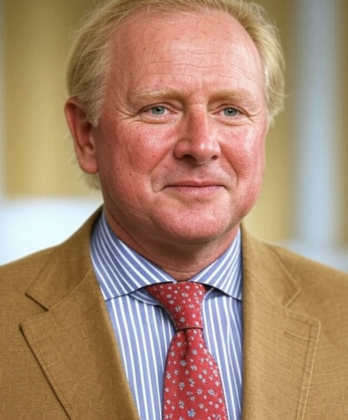
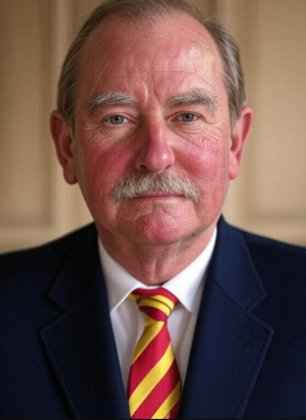
Blönland is a Federal, constitutional, parliamentary, hereditary monarchy. The current constitution, in force since 1926 with minor changes, provides for governmental authority to be exercised jointly by the King and the Prime Minister (Ministerpräsident), with a separation of powers between the executive government, the legislative (the United Diet) and the judicative (headed by the Constitutional Court).
The Crown is hereditary in the House of Blönland, a branch of the von Burgenau family, passing from father to eldest son. Women, descendants of princesses who have married out of the family and children from illegitimate or unapproved unions may not ascend to the throne. Members of the Royal Family are only allowed to marry other royals or members of the higher nobility.
The current King is Georg III, crowned after the death of his predecessor Friedrich-Alexander III in early 2024. The Blönish royal house is closely related to that of Remsfalen, the King's mother Queen Dowager Olga being a Princess of Remsfalen and a sister of the current Remsfalian monarch.
The King of Blönland retaints significant powers and exercises them frequently. This makes Blönland different from most modern constitutional monarchies, where the head of state is limited to ceremonial functions. Most democracy watchdogs consider Blönland a mixed regime due to the high influence of the monarchy and an electoral system and upper house that favor conservative elements. Many decisions are made behind the scenes in what is euphemistically described as a system of "consensus-based governance", controlled by several overlapping aristocratic patronage networks all directly or indirectly subservient to the Royal House, big business and major landowners.
The King names a Prime Minister (Ministerpräsident), by convention after each general election, and appoints ministers proposed by the PM. The current Prime Minister is Karl-Heinz von Wittig, who is considered a close friend of King Georg III.
Prime Minister and Cabinet
The current Prime Minister, Karl-Heinz von Wittig, was appointed by the King in December 2024 following the November general election. He belongs to the Vaterlandspartei and succeeded Count Walther von Glückuhn-Steinitz due to his retirement from active politics. The Wittig cabinet consists of 18 ministers, the largest number in Blönland's history. Despite forming a comfortable majority with the PNE, PM Wittig decided to integrate the other four, smaller right-wing parties present in the House of Deputies. Four ministries were created for them. The cabinet has been criticized for not including a single woman (for the first time since 2012) and for including only 7 ministers not of noble birth (among them Wittig, who was ennobled in 2022).
United Diet
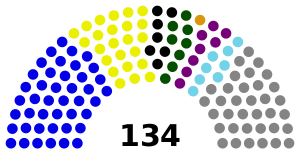
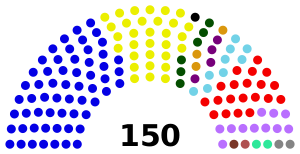
The United Diet (Vereinigter Landtag) is Blönland's bicameral legislature, merged from the legislatures of Blönland proper and Remsfalen-Lüningen in 1926. It sits in the Diet Houses in Burgenau and consists of the elected House of Deputies (Abgeordnetenhaus) and part-appointed, part-hereditary House of Lords (Herrenhaus). All laws must be passed by both chambers of the Diet and signed by the King to become valid.
House of Lords
The House of Lords currently consists of 134 members, which include holders of hereditary seats, members appointed for life by the King or by various organizations, and mayors of large cities, bishops and university chancellors who have a seat due to their office. The King may grant hereditary or lifetime appointments to the House of Lords freely, though in practice, nominations are infrequent. Currently, every single member of the House of Lords is either an independent or affiliated with a right-wing party. The last Opposition member of the House of Lords, Gerd Baumann-Starck of the SAP, died in 2019.
House of Deputies
The House of Deputies consists of 150 members, elected for a term of 5 years. 50 members are elected through federal party lists with a 5% threshold while the other 100 are elected in a first-past-the-post system, with Blönland proper and Remsfalen-Lüningen having 50 electoral districts each. As Remsfalen-Lüningen holds some 60% of the country's population, Blönland proper is slightly over-represented.
The current Government holds 113, or 75,3% of all seats. 33, or 8,7%, of the seats belong to the 4 parties of the United Opposition. The two Independents and the two LLL members do not vote with either the Government or the United Opposition.
Parties
Blönland has multiparty system. Center-right to right-wing parties have been in power since the failure of the Social-Liberal government in the 1980s. The main government parties are the conservative VP (Vaterlandspartei), the party of the Prime Minister, its nationalistic, irredentist offshoot PNE (Partei der Nationalen Einheit) and the mostly Northern, Protestant-oriented CDP (Christlich-Demokratische Partei). These have formed a variety of coalitions, usually including minor right-wing parties. The current coalition, which was formed following the 2024 elections, is dubbed the "Monster Coalition" because it consists of 7 parties and includes forces that are classified as extremist by foreign observers. The opposition parties include the SAP (Sozialistische Arbeiterpartei), which is the oldest pan-Blönland political party, and the social-liberal LP (Liberale Partei).
The opposition is subject to significant pressure, which can include demonstrative arrests and political prosecution from time to time.
Since 2012, the SAP and LP operate as an United Opposition and vote together. Smaller leftist parties have been added to the agreement since then, mirroring the behavior of the right-wing government. Both the government coalitions and the opposition parties are increasingly acting as consolidated entities not only inside but also outside of the Diet. Multiparty tickets for electoral districts have been twice as common in the 2024 General Election as in 1999.
List of Political Parties
The two Christian parties (CDP and KU) are over-represented in the House of Lords because most bishops belong to them. Independents are heavily over-represented in the House of Lords because of the frequent appointment of members from outside the political sphere, though most of them vote with the Government.
| Party Abbreviation | Full Name | Ideology | Notes | Bloc | Seats in the House of Lords
Total: 134 |
Seats in the House of Deputies
Total: 150 |
|---|---|---|---|---|---|---|
| Major Parties (represented in at least one house of the Diet) | ||||||
VP
|
Vaterlandspartei
(Fatherland Party) |
Wide-tent, Christic Conservatism, National Conservatism, Right-Libertarianism, Right-Wing Populism, Traditionalism, Unionism* | Government | 43 | 59 | |
PNE
|
Partei der Nationalen Einheit
(Party of National Unity) |
National Conservatism, Christic Nationalism, Right-Wing Populism, Traditionalism, Ethnonationalism, Irredentism, Unionism* | Split from the VP in 1983 | Government | 24 | 31 |
CDP
|
Christlich-Demokratische Partei
(Christian-Democratic Party) |
Christic Democracy, Christic Nationalism, Traditionalism, Reformed Church Interests, Unionism* | Only runs in Remsfalen-Lüningen | Government | 7 | 1 |
BB
|
Bauernbund (Farmers' League) | National Conservatism, Agrarianism, Right-Wing Populism, Aristocratic Interests (increasingly) | Only runs in Remsfalen-Lüningen | Government | 8 | 6 |
ND
|
Nationaldemokraten (National Democrats) | National Conservatism, Right-Wing Populism, Right-Wing Extremism, Militarism, Third Way, Ethnonationalism, Irredentism, Unionism* | Split from the PNE in 1999 | Government | 1 | 3 |
KU
|
Kirchenunion
(Church Union) |
Christic Nationalism, Ortholic Integralism | Only runs in Blönland proper | Government | 8 | 4 |
PdM
|
Partei des Mittelstandes
(Party of the Middle Class) |
Right-Wing Populism, Right-Libertarianism, Business Interests | Only runs in Blönland proper | Government | 8 | 9 |
SAP
|
Sozialistische Arbeiterpartei
(Socialist Workers' Party) |
Social Democracy, Democratic Socialism, Left-Wing Populism, Progressivism (increasingly), Republicanism (increasingly), Unionism* | United Opposition | 0 | 20 | |
LP
|
Liberale Partei
(Liberal Party) |
Social Liberalism, Classic Liberalism, Neoliberalism, Internationalism**, Progressivism, Unionism* | United Opposition | 0 | 11 | |
PSP
|
Progressiv-Soziale Partei
(Progressive-Social Party) |
Neoliberalism, Internationalism**, Progressivism, Democratic Socialism, Left-Libertarianism, Republicanism | Only runs in Blönland proper
Party ban pending |
United Opposition | 0 | 1 |
SDPR
|
Sozial-Demokratische Partei Remsfalens (Social-Democratic Party of Remsfalia) | Social Democracy, Remsfalen-Lüningen Separatism, Remsfalian Rattachism**, Democratic Socialism, Left-Wing Populism | Branch of the Remsfalian party of the same name
Only runs in Remsfalen-Lüningen |
United Opposition | 0 | 1 |
LLL
|
Liste Lebenswertes Lüningen
(List of Lüningen Worth Living) |
Moderate Conservatism, Lüningen Regional Interests, Autonomism | Only runs in 8 electoral districts in Remsfalen-Lüningen | None | 0 | 2 |
| Minor Parties (not represented in the Diet) | ||||||
KPB
|
Kommunistische Partei Blönlands
(Communist Party of Blönland) |
Democratic Socialism, Democratic Communism, Left-Wing Populism, Internationalism***, Republicanism | Banned under a 2016 decision of the Constitutional Court | None | 0 | 0 |
KPB-R
|
Kommunistische Partei Blönlands - Revolutionärer Block
(Communist Party of Blönland - Revolutionary Bloc) |
Revolutionary Communism, Republicanism, Left-Wing Populism, Republicanism, Left-Wing Extremism | Split from the KPB in 1977
Banned under a 2016 decision of the Constitutional Court |
None | 0 | 0 |
RB
|
Republikanischer Bund
(Republican League) |
Left-Wing Populism, Left-Libertarianism, Progressivism, Republicanism | Banned under a 2020 decision of the Constitutional Court | None | 0 | 0 |
URL
|
Partei für ein unabhängiges Remsfalen-Lüningen
(Party for an Independent Remsfalen-Lüningen) |
Remsfalen-Lüningen separatism, Big-tent Populism, Regionalism, Remsfalian Rattachism | Only runs in Remsfalen-Lüningen | None | 0 | 0 |
FPB
|
Freiheitliche Partei Blönlands
(Freedom Party of Blönland) |
Right-Wing Populism, Right-Libertarianism | Split from the LP in 1990 | None | 0 | 0 |
ÖSP
|
Ökologisch-Soziale Partei
(Ecological-Social Party) |
Green Politics, Green Socialism, Democratic Socialism, Progressivism, Republicanism | None | 0 | 0 | |
PDW
|
Partei des Dritten Wegs
(Party of the Third Way) |
Right-wing extremism, Irredentism, Third Way Politics, Ethnonationalism | None | 0 | 0 | |
EUOIA
|
Bündnis "Ja zur EUOIA"
(League "Yes to the EUOIA") |
Neoliberalism, Progressivism, Internationalism**, EUOIA Integration | None | 0 | 0 | |
| Independents | ||||||
Independents
|
Various | None/Government | 35 | 2 | ||
| In the context of Blönland, the following terms apply:
* Unionism means advocating for continuing the union between Blönland and Remsfalen-Lüningen, whether on a federal basis or in the form of a more centralized state ** Remsfalian Rattachism means advocating for a return of the Grand Duchy of Remsfalen-Lüningen to the Kingdom of Remsfalen *** Internationalism means advocating for a stronger integration of Blönland into the international and especially Ulethan community, including but not limited to full EUOIA membership and fulfillment of what progressives term "international standards", such as a fully elected legislature and abolishing the death penalty | ||||||
Constitutional Court and legal system
The Constitutional Court (Verfassungsgericht), located in Burgenau, consists of 10 judges appointed by the King following recommendation by the Diet. It is the highest court of appeal for criminal, administrative and civil cases, rules on the constitutionality of laws and on disputes between the various regional and local governments. The justices of the Constitutional Court may not belong to a political party, though most are aligned with one or multiple parties due to the partisan nature of recommendations. The current President of the Constitutional Court is Prof. Dr. Ewald von Müller, his deputy is Dr. Carl Sartorius. The court sits in the Palace of Justice in Burgenau's Government Quarter, and shares its building with several specialized Federal-level courts and the Oberlandesgericht of Blönland proper.
Subordinate courts
There are two top-level courts (Oberlandesgerichte) for each Constituent Country which hear appeals before they reach the Constitutional Court and must approve death sentences if meted out by a lower court. There are several Federal-level courts specialized in a certain field of law (labor, agriculture, administration). Most criminal and civil cases are heard by District-level courts. Some cities and municipalities have established local courts. Those that don't must name a Justice of the Peace to rule on minor civil cases and issue fines for lighter misdemeanors.
Criminal justice
Blönland enforces strict criminal laws, with mandatory death penalty for severe crimes such as murder, child sexual offenses, and drug-related crimes, resulting in 10 to 30 annual executions by hanging. Around 5% of all death sentences are issued for political crimes, which are defined very vaguely on purpose. Appeals are limited, royal pardons are rare. Harsh punishments like lengthy prison terms and whipping for minor offences are common. The country prosecutes citizens for crimes committed abroad, ignoring foreign rulings, while avoiding extradition of its own nationals and providing de facto immunity to the royal family, top officials, and aristocrats, fostering corruption. Opposition figures face targeted prosecutions, often bypassing parliamentary immunity.
Regional Governments
Blönland's unique form of federalism is a result of the annexation of the Grand Duchy of Remsfalen-Lüningen in 1854 following the 2nd Remsfalian War. At first, it formed only a loose personal union with Blönland, with Remsfalen-Lüningen being ruled by a governor appointed by the King. Unification occured gradually, with a common customs area established in 1870, a common upper house of parliament in 1919 and a common lower house and civil code in 1926. Since 1926, Blönland and Remsfalen-Lüningen are theoretically equal in their level of autonomy, though some residual laws and organs unique to Remsfalen-Lüningen make it stand out from the federal political sysem which is largely based on that of pre-1854 Blönland.
The two Constituent Countries each retain control over cultural affairs, primary and secondary education, religious affairs, local government, healthcare, social services and most infrastructure within their borders. Blönland proper and Remsfalen-Lüningen retain rump Diets (Landtage) which handle these topics and are elected together with the United Diet every four years. The Diet of Remsfalen-Lüningen consists of 100 members, sits in Collenburg and is elected through a mix of proportional representation and first-past-the-post voting, utilizing the same 50 districts as Remsfalen-Lüningen's division of the House of Deputies. The Diet of Blönland moved from Burgenau to Neustadt auf der Höhe in 1949 and consists of 75 members, all elected proportionally since 2001. Laws changing the makeup of the federal electoral districts and the border between the two constitutional countries require the approval of the devolved Diets.
The King appoints Constituent Country executives (Landeshauptleute) in coordination with the two Diets. The current Landeshauptmann of Blönland proper is Count Johann von Glückuhn-Steinitz, a cousin of the former Prime Minister, while that of Remsfalen-Lüningen is Georg von Dahmerclau.
Since 1972, the Constituent Countries' capacity to raise their own taxes is severely limited. However, the budgets they receive from the federal government are partially dependent on the amount of taxes collected there. Certain customs duties and taxes in the Collenburg and Brüxhaven free port zones as well as fisheries-related duties which are raised by Remsfalen-Lüningen under legislation originally introduced by the Kingdom of Remsfalen when the region still belonged to it. The legality of this exception was confirmed by the Constitutional Court in 1999.
There are proposals to turn the city of Burgenau, as well as Collenburg, into Federal Districts independent of their respective constituent countries.
Economy
Main article: Economy of Blönland
Blönland maintains a strong agricultural base which is complemented with industries such as automotive and defense production. Since the 1980s, the government sought to centralize production by promoting business parks outside cities and near motorways, often creating favorable road and railway accesses.
 | |
|---|---|
| Economy of Blönland | |
| mixed | |
| Currency | Blönland Crown (Blönländische Krone) - 1 BKr = 100 S (Schilling). |
| Monetary authority | Blönland National Bank (Blönländische Landesbank) |
| HDI () | very high |
| Unemployment rate | 3.5% |
| Principal exports | Grains, dairy, wood |
| Principal imports | Coal, oil, ores, metals |
| (custom label that appears in bold on the left side of the infobox) | (custom information that is defined by custom_label1) |
| (custom label that appears in bold on the left side of the infobox) | (custom information that is defined by custom_label1) |
The tertiary sector begun rapidly developing after the fall of the Social-Democratic Coalition and most international banks, except for those associated with Izaland, maintain a presence in Burgenau and in Collenburg, attracting both ambitious climbers from Blönland's middle classes and expats from other parts of Uletha.
Infrastructure
Main article: Infrastructure in Blönland
Culture
Main article: Culture of Blönland




